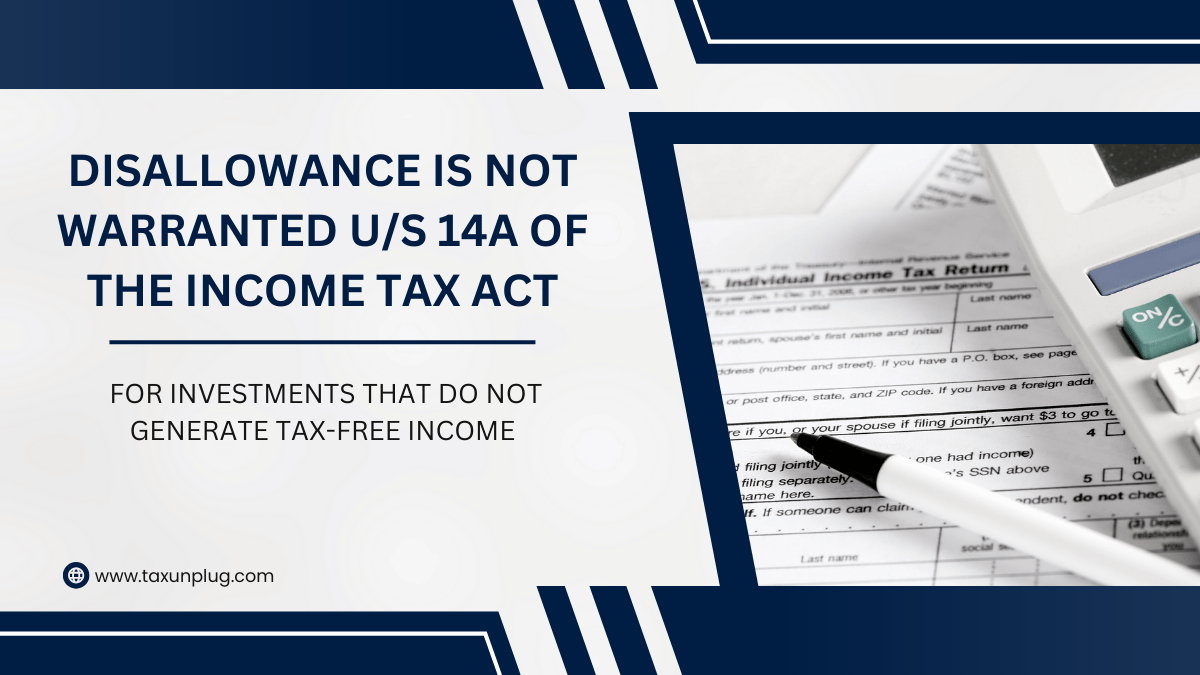Disallowance is not warranted u/s 14A of the Income Tax Act
DCIT v. Paranjapee Schemes Construction Ltd. [ITA No. 4090/Mum/2023] (ITAT Mumbai)
The case mainly centers on two primary grounds for appeal:
- disallowance of overseas travel expenditures and
- disallowance under section 14A r.w.rule 8D.
Ground 1: The assessee had made suo-moto disallowance to the tune of INR 53,79,526/- in respect of expenses incurred on exempt income. The AO disallowed INR 4,08,32,574/- by applying section 14A r.w.rule 8D of the Act.
The assessee’s total non-current investments were calculated by the AO, resulting in a disallowance of INR 3,06,04,372/- under section 14A r.w.rule 8D @ 1%, and a balance of INR 2,52,24,846/- was added on account of disallowance under section 14A and rule 8D.
Before the Ld. CIT(A), the assessee argued that rule 8D cannot be invoked without satisfaction, and only exempt income-generating investments can be considered for disallowance. The amendments in section 14A introduced by Finance Act 2022 cannot be assumed to have retrospective effect.
The Ld.CIT(A) ruled that the appellant’s disallowance, despite recording satisfaction before making it, is not justified due to the decisions of the Bombay High Court and the ITAT co-ordinate bench.
The ITAT observed that the assessee had correctly calculated a suo-moto disallowance of INR 53,79,626/- based on the monthly average of investments submitted by Ld. AR and Ld. DR, resulting in a total average of INR 5,32,99,615/-.
The AO had considered investments that have not generated income, citing the Bombay High’s decision in Pr. CIT v/s Ballarpur Industries Ltd, which ruled that no disallowance under Section 14A is warranted for investments not yielding tax-free income for the assessee.
The assessee argued that it had not earned any exempt income from equity and debenture instruments, thereby allowing no disallowance of expenditure. The Supreme Court’s decision in PCIT v/s Oil Industry Development Board (2019), dismissed the SLP filed against the Delhi High Court’s order upholding the ITAT’s decision to delete the disallowance u/s 14A.
Ground 2: Facts in this regard were, that the assessee had claimed INR 20,38,038/- in foreign travel expenses, but the AO disallowed them due to the lack of justification for their nature and connection to business and profession.
The Ld. CIT(A) noted that the AO did not consider the assessee’s reply during the assessment proceedings and deleted the addition, stating that the expenses were incurred for business purposes.
The assessee conducted Project ‘Athashri’ in Pune for Senior Housing, and the Director of the company travelled to the USA to replicate the project for Indian senior citizens. The company also attended the 19th Annual International Convention NETCON 2019 in Tel Aviv for business purposes.
The AO did not consider submissions, and the Ld.CIT(A) therefore allowed the claim of foreign travel expenses under section 37(1) of the Act.
After considering the factual matrix, in the light of the various judicial pronouncements, the ITAT were of the view that the decision of the Ld. CIT(A) on this issue deserved to be upheld.
As a result, the appeal filed by the revenue was dismissed.
Disallowance is not warranted u/s 14A of the Income Tax Act for investments that do not generate tax-free income:
To download official order, click here.“The site is for information purposes only and does not provide legal advice of any sort. Viewing this site, receipt of information contained on this site, or the transmission of information from or to this site does not constitute an attorney-client relationship. The information on this site is not intended to be a substitute for professional advice.”

